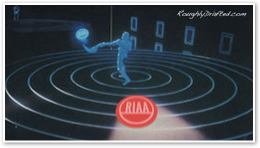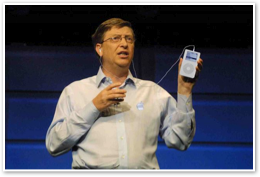
The iTunes Vendor Lock In Myth
According to proponents of this myth, Apple's iTunes is unfairly locking Microsoft, Real, and Sony out of the market for digital music by blocking rivals’ efforts to put their own DRM systems on iPods, and is using vendor lock in to distort the market for online music and players. They're wrong, here's why.
Why the Myth was Woven
This myth was created by an unlikely coalition of DRM supporters and free software advocates. The DRM supporters are upset that their own systems haven't taken off, while free software advocates don't want any DRM at all. Apple's FairPlay fits solidly in the targets of both extremes.
Because of that, many DRM advocates are spinning their comments to suggest they now believe that DRM is bad for consumers. In reality, they are really just embittered by Apple's success. Bill Gates, one of the foremost proponents of DRM, recently made comments along those lines.
Bill Gates' Unlikely Attack on DRM
How could that be? Remember it was Gates who presented Palladium--an impenetrable new hardware-enforced DRM architecture--as his vision of the future for PCs.
Gates was also the visionary behind Janus DRM for music, and brought "phone-home" activation DRM to Windows and Office. He certainly has no interest in free software idealism and open content.
 His company targeted the removal of MP3 and sought to roll out WMA in its place as an impossibly secure DRM system that doesn’t just limit unauthorized mass duplication, but actually allows content creators to destroy consumers' music and movies the moment users stop paying for ongoing rental fees.
His company targeted the removal of MP3 and sought to roll out WMA in its place as an impossibly secure DRM system that doesn’t just limit unauthorized mass duplication, but actually allows content creators to destroy consumers' music and movies the moment users stop paying for ongoing rental fees. When that heavy handed approach backfired, Microsoft found itself as a bit player, evicted from materially participating in the online music and movie industry and sitting on years of expensive, but now useless development work designed primarily to police a failed business model: exploding media rentals.
Microsoft’s Failure Recycling
In typical Microsoft style, the first tactic for dealing with failure is to rebrand a failed technology under a different name. When that fails, the second tactic involves going on the offensive to attack successful products with FUD and unrealistic vaporware promises until a new product can be invented to compete in the race.
In this case, Janus and PlaysForSure were rebranded under the Zune logo. As that "new" product's dramatic failure unfolds, Gates has inexplicably lashed out at “DRM,” which quite pointedly means Apple's competing iTunes, the only DRM system that has succeeded in the market for online music.
Gates says DRM “causes too much pain for legitimate buyers" and that no one has done it right yet. What he means of course, is that the billion and a half tracks Apple has sold so far through iTunes have done nothing to enrich Microsoft. The solution demands reconfiguring the market so that Microsoft owns everything.
Gates Sings a Saccharine Song to Bloggers
Gates made those comments in a meeting with bloggers, none of whom were fans of DRM. It's not surprising that he told them exactly what they wanted to hear as he handed them free Zunes and downplayed its DRM-driven features.
What was probably most surprising was that every blogger in attendance at the meeting had a Mac, and were effortlessly using an ad hoc Airport Express wireless network. Michael Arrington reported highlights of the meeting, which included the "look on Gates’ face" at seeing so many Macs brought to Microsoft's headquarters.
Mac sightings have grown increasingly common; Mark Hurd, the CEO of HP, recently questioned why so many analysts were bringing Mac Book Pro laptops to HP meetings; Arik Hesseldahl of BusinessWeek reported that HP hardware wasn't the issue, but rather the problems associated with running Windows.
Are iTunes Users Locked In?
Vendor lock in distorts the functioning of free markets. Given a choice, the market will select the best product at the best price. However, if consumers are artificially tied to a product, they can't choose other options. Vendor lock in results in expensive or inferior products being more popular, simply because there are no alternatives.
Consider Windows: Both Gates and Hurd were surprised to see Macs in corporate IT settings because over the last decade, Windows has become by far the most popular desktop operating system. Did the market select Windows by choice as the best option, or are users forced to buy Windows because of vendor lock in?
Now compare iTunes and the iPod: Apple currently enjoys a majority share of both the music player and online music markets. Is that because people choose to buy iPods, or because the market offers no choice in competing models and is distorted by vendor lock in?
Vendor Lock In Examples
Vendor lock in is commonly used in various degrees to create buyer loyalty. If customers are stuck using a product, they are obviously less likely to defect to competing products. Vendors like lock in.
However, if vendor lock in becomes the only reason why customers use a product, the vendor will often fail to remain competitive and allow the quality and value they offer to slide. Eventually, that leaves an opening for potential competition. Consider some examples:
- QuarkXPress quickly became the de facto professional desktop publishing application. Its extension plugins and closed document file type helped lock publishers to the system, leaving little room for competition.
Quark relied on vendor lock in to keep prices high, introduce unreasonable licensing, and let its product coast along with minimal advances. Quark particularly slipped when it made little effort to support Mac OS X. It lost its clear lead as a result, because customers were induced to try alternatives, particularly Adobe InDesign.
- In the late 80's, Apple focused entirely on the high end of the desktop market in Macintosh sales.
Mac development, lead by Jean Louis Gassée, intentionally targeted higher prices because the company's customers were ready to pay more for the system, and could be forced to because there were no options.
Rather than working to remain competitive, Apple grew soft and unfocused while letting Microsoft build a cheaper alternative based on the DOS PC. By the mid-90s, Apple's position as the leader in graphic desktop operating systems was taken by Microsoft.
- Over the last decade Microsoft has allowed Windows to repeatedly slip. It issued a flurry of increasing bad DOS-based versions well into 2000. Since then, it has similarly slipped its significant update to Windows XP.
Meanwhile, Microsoft is raising prices and introducing increasingly invasive DRM into Windows Vista to prevent users from doing things such as reusing licenses they have already bought on an upgraded computer.
- In the video game world, Microsoft has worked to lock games development to Windows PCs using DirectX. That vendor lock in has been extended to console video games in the Xbox line, which uses the same proprietary technologies to tie game development to Microsoft’s products.
- All closed platforms, from the Xbox and PlayStation game consoles to Windows and Mac OS X, seek to tie unique software to the platform in order to make its systems more attractive.
Vendor lock in is everywhere in varying amounts. However, of all the examples of vendor lock in technology, Apple's iTunes is the weakest possible, because it is completely optional and easy to unlock.
Optional Lock In Is Not Lock In
The easiest way to pull apart the iTunes Vendor Lock In Myth is to point out that DRM content in iTunes is completely optional. Customers can use their existing MP3s, rip their own CDs, and download podcasts using iTunes, all without touching any DRM at all.
There are no features on the iPod that demand DRM. Conversely, Microsoft's iPod alternatives are full of DRM, and vendor lock in is a major component of the strategies used in designing both the players and the music services to which they are tied.
 Microsoft's PlaysForSure and Zune both make DRM subscription music a centerpiece strategy; that requires complex DRM on the player. On the iPod, subscription music isn’t even an option; by intentional design, it can't delete your content or prevent you from listening to it after a set expiration date.
Microsoft's PlaysForSure and Zune both make DRM subscription music a centerpiece strategy; that requires complex DRM on the player. On the iPod, subscription music isn’t even an option; by intentional design, it can't delete your content or prevent you from listening to it after a set expiration date.Wireless sharing, the highly touted feature of Zune, is similarly encrusted with DRM restrictions. Even if the device does not re-encode the files, it does quarantine them to prevent second hand sharing and terminates them after a set time period. Neither DRM function is even possible on the iPod.
Unlockable Lock In Is Not Lock In
Besides being entirely optional, DRM content from iTunes also allows easy user access. While providing a barrier to the mass duplication and dumping of commercial content on sharing sites, iTunes makes it easy to burn purchased music to CD, which can then be used in a car CD changer, or used with other players.
Is there tie in between the purchased content from iTunes and the iPod? Yes. Is it an example of vendor lock in that is at all comparable to other closed platforms? No.
It's nothing like Quarks' proprietary software or Microsoft's DirectX development, where content is permanently tied to a single system in a way that is expensive or impossible to work around. Unlike proprietary platforms such as Windows, the Mac, and game consoles, where titles only work on a target system, music plays everywhere.
Anyone harping on iTunes and vendor lock in needs to stop and think:
-
•Can you push a button on an Xbox and dump out Xbox games on a CD that will play on a PlayStation?
-
•Can you do anything similar on the Sony PSP, allowing your games to work on a Nintendo DS?
-
•Can you export Windows Office apps from a Windows PC into a form that works on Linux or a Mac?
No, in all cases you have to buy a new version or--if the vendor doesn't support your platform--go without. Those are all examples of vendor lock in, and their fairness or “damage” to affected markets is debatable.
The problem of vendor lock in does not even apply to the iPod and consumers who have bought music from iTunes, which can all be popped out on a CD and used anywhere.
Much Ado About Nothing
That being the case, why haven’t we heard anything about the evil vendor lock in of Windows, or the Xbox, or any number of other platforms? 

Why is vendor lock in only related to iTunes music? Why do consumers need to be warned about a problem that doesn’t exist? Easy answer: iTunes is a problem for vendors of abusive DRM.
Next Article:
This Series










Sunday, December 17, 2006




 Bookmark on Del.icio.us
Bookmark on Del.icio.us Discuss on Reddit
Discuss on Reddit Critically review on NewsTrust
Critically review on NewsTrust Forward to Friends
Forward to Friends
 Get RSS Feed
Get RSS Feed Download RSS Widget
Download RSS Widget





